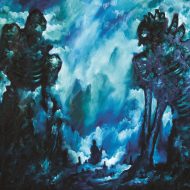 It has been an extremely long time since I’ve actively enjoyed listening to an album that contains no guitars, bass or drums. So long, in fact I cannot actually remember when it was. Well Hazard has changed that all on his own, primarily owing to the fact that he does the vocals and plays all the instruments, and there are many, on the album. This has a 19th century orchestral sound, due to the orchestral instruments employed, but with very black metal sensibilities and extremely harsh and gruff vocals accompanying the choral ones.
It has been an extremely long time since I’ve actively enjoyed listening to an album that contains no guitars, bass or drums. So long, in fact I cannot actually remember when it was. Well Hazard has changed that all on his own, primarily owing to the fact that he does the vocals and plays all the instruments, and there are many, on the album. This has a 19th century orchestral sound, due to the orchestral instruments employed, but with very black metal sensibilities and extremely harsh and gruff vocals accompanying the choral ones.
The album comes in the form of 6 chapters with lyrics written in the same form of ‘Les Chants de Maldoror’ from Comte de Lautréamont, a French author from the 19th century, tackling existential themes, none of which I can make out as they are all in French. That said, it’s more the melodies and delivery of the words than their content that I’m enjoying here.
All songs are around 7 minutes in length and opening track “Chant I – Le Théâtre” sets the scene with some very slow paced but deep sounds over the rasping chants before filling out with a string section and brass to go with the melodic choral vocals and timpani.
“Chant II – Le Soleil” also builds very slowly but in a way that heightens the tension as it fades to gongs, chimes and xylophones with strings accompanying the vocals. In many ways it reminds me of Chaostar where the fusion of music and vocals of different forms meld to give a completely new style.
The orchestral percussion and chanting death growls on “Chant III – L’Homme” are tempered by the ultra-melodious strings and wind instruments before fading the music to a background for long drawn out rasps of anguish punctuated by quick sharp notes for emphasis.
In much the same way “Chant IV – L’Enfant” opens with low bassy brass rumbles over nearly whispered growls that pick up in pace as the military snare does the same to crescendo with raw shrieks of utter despair.
The slowest and shortest song is “Chant V – Le Die” with plenty of shrill woodwinds bolstering the sound.
Wrapping up with “Chant VI – Le Vieillesse” you can tell the album should be listened to as a whole as everything builds and flows into the next song and that effect would be lost listening to the songs individually, in much the same way many symphonies are better appreciated as a whole rather than just brief movements.
(8/10 Marco Gaminara)

Leave a Reply